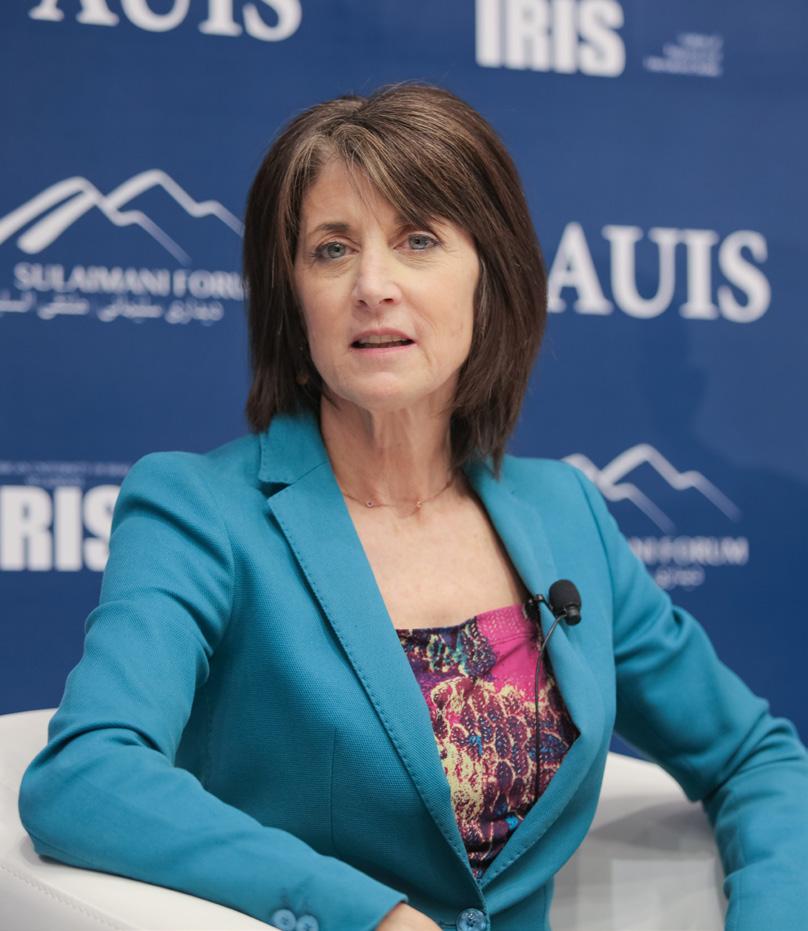
6 minute read
Protecting Stability: The Role of Governance
from 2019 Sulaimani Forum
by Awder4
Speakers: Denise Natali Assistant Secretary for the Bureau of Conflict and Stabilization Operations for the US Department of State Qusay Suhail Minister of Higher Education and Scientific Research, Iraq Yara Salem Special Representative for the World Bank in Iraq Ramon Blecua Former EU Ambassador to Iraq Toby Fyfe President of the Institute on Governance
Advertisement
Protecting Stability: The Role of Governance
This panel discussion was moderated by Peter Bergen, British-American journalist and author, who currently serves as CNN’s National Security Analyst, and New America’s Vice President. One of his most notable achievements was the production of the first television interview with Osama bin Laden in 1997. He started off the panel by giving the panelists five minutes for opening remarks before turning to each of them with questions.
Natali began by underscoring the US approach to stabilization. She emphasized that while ISIS had committed heinous crimes against humanity, great progress had been made by Iraq’s security forces in order to liberate areas previously controlled by ISIS. For the US, a top priority is to ensure the defeat of ISIS and support the return of IDPs back to their homes, mentioning that the US had provided Iraq with USD 2.5 billion since 2014. Moreover, since 2015, the US has helped destroy or clear over 76,000 square meters of weapons inside Iraq. Noting an outstanding US initiative is to address the issue of persecuted minorities in the Nineveh plains, Natali argued that while the provision of stabilization aid would continue, the manner of implementation would differ from past efforts. The recent Stabilization and Assistance Review put a new framework and guidelines in place. Natali explained that this new approach was informed by past US policy failures in Afghanistan. Stabilization would no longer be centered around large reconstruction projects. Instead, US stabilization efforts would consist of targeted efforts in collaboration with local partners and the central government.

ISIS has committed great crimes against humanity, and there has been much progress made by Iraqi security forces, by Kurdish peshmerga, by the Hashd al Shaabi in liberating territories controlled by ISIS and in addressing some of these atrocities. “
Suhail highlighted the challenges facing the current administration. The first being the balance required between establishing security and enabling the economic growth of the country, as well as integrating the development of both security and economic sectors. This process is underway in Baghdad, with several factors to be taken into account. Firstly, the prosecution of foreign ISIS fighters currently in custody will involve cooperating and communicating with other governments. The second challenge pertains to the generational gaps in the population of Iraq and the different priorities of these demographic groups. Noting that the three wars his generation has witnessed not only caused significant damage to the infrastructure of the country, but also to the psyche of its people. The third challenge is to navigate the shifting trends and [Neighboring or Arab countries] can prove to be agents of stability within Iraq. “ “ alliances that are made on political and economic levels, as well as in terms of ideology and sectarian identities. Sectarian strife has long been a point of contention for past administrations, but there must be tangible solutions proposed by the current administration to help bridge the divide. The most pressing priority, he argued, is establishing or resuming projects to build infrastructure, which would lead to job creation and the reduction of unemployment.

Salem emphasized that empowering the private sector is essential in order to tailor stabilization efforts in different parts of the country. Recovery and reconstruction, she argued, could not be put off until stabilization was fully achieved. Therefore, the World Bank would continue to work with the Iraqi government and the international community on five initiatives. The first goal is to create private sector jobs in construction and agriculture, as well as supporting small and medium-sized enterprises in the short term. The second is to develop the human capital of Iraq’s youth, with special emphasis on education, health, and social protection. The third seeks to provide social services, particularly electricity and water. The fourth supports building transparency and accountability within banking and state-owned enterprise. The final goal is the management of Iraq’s wealth from gas, oil, and agriculture. None of these initiatives will succeed without robust deadlines and accountability mechanisms, she contended. “We see the private sector, with entrepreneurship, at the heart [of stabilization, recovery, and reconstruction]. We need to find a way to do these things in parallel because we cannot wait for stabilization before we begin with recovery and reconstruction. “

Ramon Blecua Former EU Ambassador to Iraq
Blecua noted that Iraq is a rich country but whose citizens often lack basic social services. Internal strife and terrorism, sanctions, and foreign intervention have had terrible outcomes for the Iraqi people. On the other hand, Iraq has witnessed incredibly successful humanitarian operations, including those that enabled millions of IDPs to return to their cities of origin with remarkably low levels of violence.

“Internal strife, terrorism, sanctions, [and] foreign intervention have taken a terrible toll on the Iraqi population, but [Iraq] is also where one of the most remarkably successful humanitarian operations have taken place. “
International actors need to present novel solutions to the country’s problems that are resultsoriented, as well as flexible enough to incorporate new challenges. Nevertheless, while there are reasons for concern, Blecua argued that there are a greater number of reasons to be hopeful.
Iraq could serve as a model in the region as few countries can claim to have absorbed as many violent events and destructive political dynamics, yet retain such a vibrant and democratic political framework. Iraq proves that there is hope for democratic alternatives in the Arab world.
Fyfe highlighted the Institute on Governance’s commitment to promoting stability in Iraq. He agreed with H.E Dr. Barham Salih’s previous comments that two central issues remain: The first is to foster good governance and the second is doing so within the context of a civic state. He further argued that stability was strengthened by citizen trust, itself an outcome of good governance. Referencing Canada’s federal model, there are a number of principles to keep in mind when power is transferred from the central government to the provinces. The first concerns legitimacy; when citizens accept the legitimacy of the government and are willing to accepts its decisions even if they do not agree with them. The second principle is related to the direction and purpose of government policy pertaining to decisions made when implementing decentralization. The third concerns the provision of social services, without which the federal system is at risk. The fourth principle demands transparency and accountability from the government. Finally, citizens can make demands and have expectations of their government. The advancement of these five principles requires significant back and forth between Iraqis working at the national and local levels. Fyfe concluded that ultimately, institutions need to have fiscal authority and the skills required in order to promote and implement constructive change.











